Xinyi Lu
AI-Mediated Feedback Improves Student Revisions: A Randomized Trial with FeedbackWriter in a Large Undergraduate Course
Feb 18, 2026Abstract:Despite growing interest in using LLMs to generate feedback on students' writing, little is known about how students respond to AI-mediated versus human-provided feedback. We address this gap through a randomized controlled trial in a large introductory economics course (N=354), where we introduce and deploy FeedbackWriter - a system that generates AI suggestions to teaching assistants (TAs) while they provide feedback on students' knowledge-intensive essays. TAs have the full capacity to adopt, edit, or dismiss the suggestions. Students were randomly assigned to receive either handwritten feedback from TAs (baseline) or AI-mediated feedback where TAs received suggestions from FeedbackWriter. Students revise their drafts based on the feedback, which is further graded. In total, 1,366 essays were graded using the system. We found that students receiving AI-mediated feedback produced significantly higher-quality revisions, with gains increasing as TAs adopted more AI suggestions. TAs found the AI suggestions useful for spotting gaps and clarifying rubrics.
Exploring LLM-Generated Feedback for Economics Essays: How Teaching Assistants Evaluate and Envision Its Use
May 21, 2025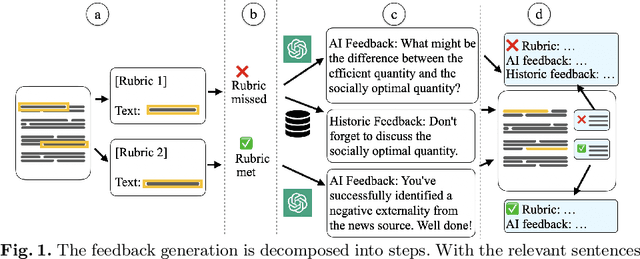
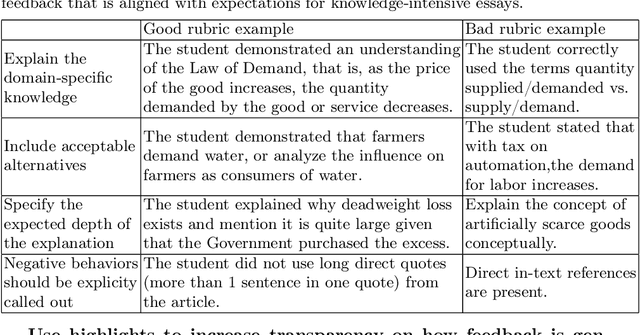
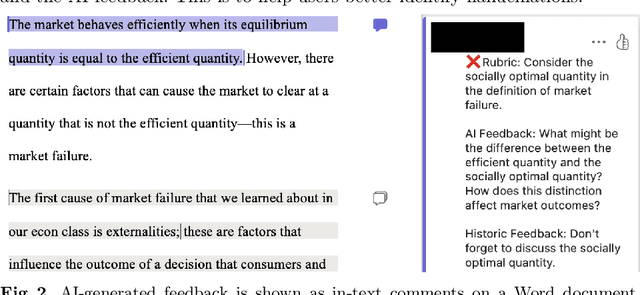
Abstract:This project examines the prospect of using AI-generated feedback as suggestions to expedite and enhance human instructors' feedback provision. In particular, we focus on understanding the teaching assistants' perspectives on the quality of AI-generated feedback and how they may or may not utilize AI feedback in their own workflows. We situate our work in a foundational college Economics class, which has frequent short essay assignments. We developed an LLM-powered feedback engine that generates feedback on students' essays based on grading rubrics used by the teaching assistants (TAs). To ensure that TAs can meaningfully critique and engage with the AI feedback, we had them complete their regular grading jobs. For a randomly selected set of essays that they had graded, we used our feedback engine to generate feedback and displayed the feedback as in-text comments in a Word document. We then performed think-aloud studies with 5 TAs over 20 1-hour sessions to have them evaluate the AI feedback, contrast the AI feedback with their handwritten feedback, and share how they envision using the AI feedback if they were offered as suggestions. The study highlights the importance of providing detailed rubrics for AI to generate high-quality feedback for knowledge-intensive essays. TAs considered that using AI feedback as suggestions during their grading could expedite grading, enhance consistency, and improve overall feedback quality. We discuss the importance of decomposing the feedback generation task into steps and presenting intermediate results, in order for TAs to use the AI feedback.
MeetMap: Real-Time Collaborative Dialogue Mapping with LLMs in Online Meetings
Feb 03, 2025



Abstract:Video meeting platforms display conversations linearly through transcripts or summaries. However, ideas during a meeting do not emerge linearly. We leverage LLMs to create dialogue maps in real time to help people visually structure and connect ideas. Balancing the need to reduce the cognitive load on users during the conversation while giving them sufficient control when using AI, we explore two system variants that encompass different levels of AI assistance. In Human-Map, AI generates summaries of conversations as nodes, and users create dialogue maps with the nodes. In AI-Map, AI produces dialogue maps where users can make edits. We ran a within-subject experiment with ten pairs of users, comparing the two MeetMap variants and a baseline. Users preferred MeetMap over traditional methods for taking notes, which aligned better with their mental models of conversations. Users liked the ease of use for AI-Map due to the low effort demands and appreciated the hands-on opportunity in Human-Map for sense-making.
COMEX Copper Futures Volatility Forecasting: Econometric Models and Deep Learning
Sep 12, 2024


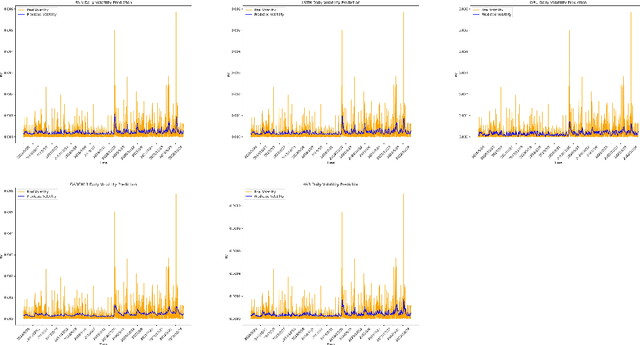
Abstract:This paper investigates the forecasting performance of COMEX copper futures realized volatility across various high-frequency intervals using both econometric volatility models and deep learning recurrent neural network models. The econometric models considered are GARCH and HAR, while the deep learning models include RNN (Recurrent Neural Network), LSTM (Long Short-Term Memory), and GRU (Gated Recurrent Unit). In forecasting daily realized volatility for COMEX copper futures with a rolling window approach, the econometric models, particularly HAR, outperform recurrent neural networks overall, with HAR achieving the lowest QLIKE loss function value. However, when the data is replaced with hourly high-frequency realized volatility, the deep learning models outperform the GARCH model, and HAR attains a comparable QLIKE loss function value. Despite the black-box nature of machine learning models, the deep learning models demonstrate superior forecasting performance, surpassing the fixed QLIKE value of HAR in the experiment. Moreover, as the forecast horizon extends for daily realized volatility, deep learning models gradually close the performance gap with the GARCH model in certain loss function metrics. Nonetheless, HAR remains the most effective model overall for daily realized volatility forecasting in copper futures.
Why Antiwork: A RoBERTa-Based System for Work-Related Stress Identification and Leading Factor Analysis
Aug 24, 2024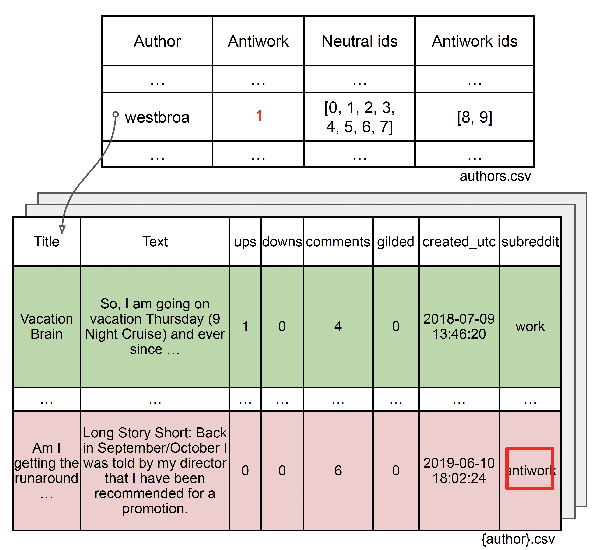

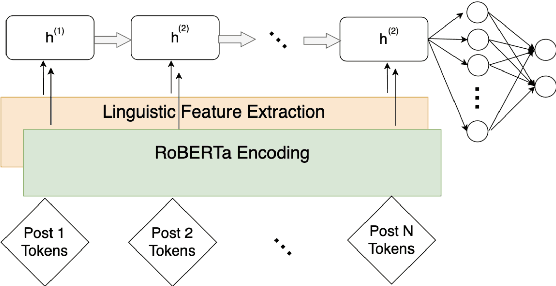

Abstract:Harsh working environments and work-related stress have been known to contribute to mental health problems such as anxiety, depression, and suicidal ideation. As such, it is paramount to create solutions that can both detect employee unhappiness and find the root cause of the problem. While prior works have examined causes of mental health using machine learning, they typically focus on general mental health analysis, with few of them focusing on explainable solutions or looking at the workplace-specific setting. r/antiwork is a subreddit for the antiwork movement, which is the desire to stop working altogether. Using this subreddit as a proxy for work environment dissatisfaction, we create a new dataset for antiwork sentiment detection and subsequently train a model that highlights the words with antiwork sentiments. Following this, we performed a qualitative and quantitative analysis to uncover some of the key insights into the mindset of individuals who identify with the antiwork movement and how their working environments influenced them. We find that working environments that do not give employees authority or responsibility, frustrating recruiting experiences, and unfair compensation, are some of the leading causes of the antiwork sentiment, resulting in a lack of self-confidence and motivation among their employees.
 Add to Chrome
Add to Chrome Add to Firefox
Add to Firefox Add to Edge
Add to Edge